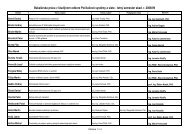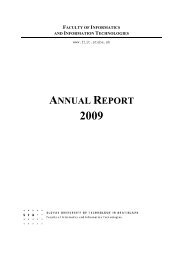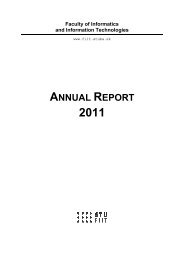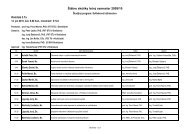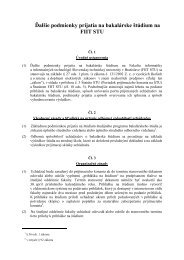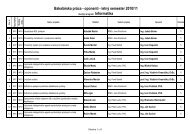elektronická verzia publikácie - FIIT STU - Slovenská technická ...
elektronická verzia publikácie - FIIT STU - Slovenská technická ...
elektronická verzia publikácie - FIIT STU - Slovenská technická ...
Create successful ePaper yourself
Turn your PDF publications into a flip-book with our unique Google optimized e-Paper software.
Personalized Collaboration 263<br />
In computer-mediated setting, people communicate via e-mail, videoconferencing,<br />
discussion boards, social networking software, etc. This has led to the notion of virtual<br />
team, denoting any team whose members’ interactions are mediated by time, distance, and<br />
technology (Driskell, 2003), i.e. that the team works together on a common task while<br />
physically separated. The effects of computer-mediated communication technologies are<br />
twofold. Positive effects include better access to and diffusion of information, and easier<br />
connection with others, and negative effects as information overload, less face-to-face<br />
communication, and increased isolation of individual members.<br />
Earlier research showed that in a student group the differences in personal status are<br />
reduced in virtual setting (Parks, 1999). In face-to-face discussions few dominant members<br />
with higher status talk most of the time, and many group members limit their contributions<br />
to supporting the main positions that emerge. In computer-mediated setting on the<br />
other hand, social cues are reduced, and people communicate on the basis of their opinions<br />
and knowledge rather than their social status. In some tasks this proves counterproductive,<br />
and virtual groups perform poorly on decision-making and negotiation tasks where<br />
a consensus on issues is required. Then again, due to more effective and focused communication<br />
tasks such as brainstorming and problem-solving are better suited to virtual<br />
groups (Hertel, 2005). In organizational setting however, members of a virtual team remain<br />
aware of the status of others regardless of the technology used (Driskell, 2003).<br />
Virtual groups also provide effective social support to people in need. Members of<br />
self-help groups instead of leaving their homes and travelling to the meeting are brought<br />
together by computer technology (Tate, 2004). When anonymous, members are not identifiable<br />
and reveal more intimate details about their experiences and respond more emotionally<br />
to others than in a face-to-face meeting. Members praise the quality and quantity<br />
of information they receive; more factual and practical advice is exchanged while instances<br />
of inappropriate behavior and hostile postings are rare (Houston, 2002).<br />
Incentives & Reputation<br />
Success of an interaction largely depends on the amount of effort invested and the reliability<br />
of the parties involved. By participating in large communities the potential for possible<br />
interactions is enormous, and before entering into relations with some unknown others we<br />
need to verify their credibility.<br />
For this purpose, reputation as an aggregated record of previous interactions is collected,<br />
maintained and disseminated to others by the use of reputation systems. The history<br />
of entity’s past interactions accounts for its ability and reliability, allowing others to make<br />
informed choices about how and whether to work together with that entity. Furthermore,<br />
the expectation that current performance will be made visible in the future discourages<br />
cheating and exerting poor effort, and thus creates incentives to perform well and reliably.<br />
Reputation systems process (1) objective feedback such as time spent solving<br />
a particular task, agreed sale price, and (2) subjective feedback such as satisfaction ratings of<br />
working with others. Reputation is computed by aggregating previous reports across users<br />
and time, and often relies on transitivity of trust in that reports originating from more reputable<br />
users are weighted more that those from users having a lower reputation.



